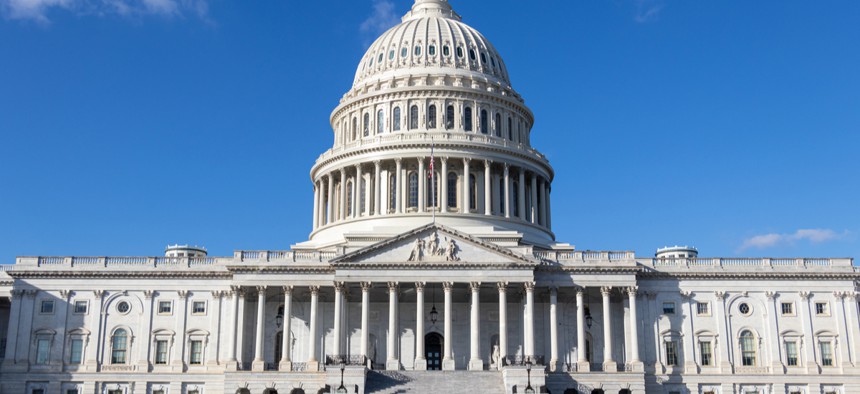It’s Time to Consider Reviving Federal Revenue Sharing With States and Cities

US Capitol Building. SHUTTERSTOCK
COMMENTARY | The General Revenue Sharing program of the 1970s helped ease stresses on state and local budgets. That program could now help localities recover as they deal with the economic fallout of Covid-19.
Local governments across the United States are leading the public response to the Covid-19 pandemic. From residential rent and utility assistance in Memphis to small business grants in Detroit, cities, towns, and counties see the unique needs of their residents and are crafting effective responses to this crisis. Yet, providing this assistance and responding to the pandemic is taking an economic toll on local governments and putting them in a precarious financial position.
While Congress provided $150 billion for state, tribal and local governments through the 2020 Coronavirus Aid, Relief, and Economic Security (CARES) Act, its impact was limited. The amount given equals less than 6% of what state and local governments raised in tax revenue on their own in 2018. And direct aid from the CARES Act only went to local governments with populations larger than 500,000—meaning the majority of communities had to wait for their state governments to allocate the aid, which further hindered local action.
A recent survey shows 75% of city governments in Georgia believe they will be less able to meet their financial needs in the next budget year. Similar concerns are reported by local officials in surveys conducted in Colorado and Michigan, and in research conducted by the National League of Cities.
Despite months of requesting that Washington provide more aid to local governments, Senate Republicans resisted. Now, with Democrats in control of both chambers of Congress and President Biden in office, prospects for direct state and local aid are increasing. If Congress crafts new relief legislation for locals and wants to ensure a stronger recovery, it should turn to the history books and embrace the General Revenue Sharing model, a multi-year funding vehicle with proven results.
In 1972, President Richard Nixon and Congress deployed the General Revenue Sharing model to ease stresses on state and local budgets and push local decision-making power out of Washington. This model, which enjoyed bipartisan support, distributed about $83 billion in aid to state and local governments over a period of fifteen years for capital improvement projects or to maintain service levels. Despite its success, the program ended during President Ronald Reagan’s budget reduction efforts due to criticisms that the program was too broad and spent money in places that didn’t need federal aid. However, evaluations of the program reveal it led to strategic local choices and identified the same type of shovel-ready work that helped the country recover after the Great Recession.
Renewing General Revenue Sharing today is the right choice because recent relief packages underinvested in local governments. The CARES Act targeted aid too narrowly and took too much time to reach the local level. In contrast, General Revenue Sharing can be broad, innovative and support a well-planned recovery. Broad distribution means all local governments can expect new, flexible resources. It means that in addition to cities and counties, Congress could send aid to school districts and special purpose districts, local units that are also suffering during the pandemic.
A multi-year program allows communities to plan future action with direct public input. This nationwide investment can prompt town hall meetings and local discussions about public health and economic recovery. By cutting the burdensome rules on how the money is spent, local innovation will be unleashed. To be successful, these conversations must generate strategic plans for local action, with community support and additional commitments from the private sector and philanthropic organizations.
With local planning, federal flexibility will help communities envision a post-Covid reality. Importantly, the multi-year commitment will allow localities to avoid the problem of using federal funds to plug immediate budget holes without making new investments. And voters can demand accountability and monitor action at the local level.
Over 90,000 local governments across the country are positioned to respond to their needs in a way that Congress and federal agencies cannot. As those local governments continue to lobby for aid, they should encourage Congress to take advantage of the General Revenue Sharing model, which will enable them to craft broad, innovative and planned responses to pandemic recovery.
Eric Zeemering, Ph.D. is an associate professor in the School of Public and International Affairs at the University of Georgia, where he teaches local government management.
NEXT STORY: In The Sweetheart City, Love Endures—Even During Covid





